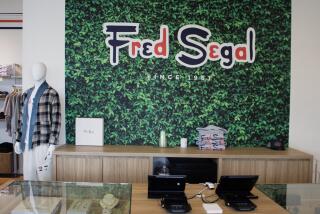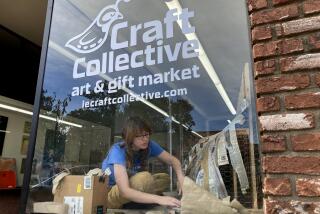Despite Cost, Dot-Coms Pull Retailers Into Net
- Share via
TOLUCA LAKE — You’re planning the great escape--cyberstyle.
You’re a retailer, ready to say goodbye to escalating rents, hassles with parking and face-to-face flare-ups with unreasonable customers.
You’re closing the door on your Main Street store and hawking your wares solely in cyberspace. Next stop, mystore.com.
Actress Angela Cartwright, longtime proprietor of the eclectic Toluca Lake gift shop Rubber Boots, did it. So did Blue Nile, a Seattle-based diamond merchant.
And, in a move that made it the poster child in the bricks vs. clicks debate, so did Egghead Inc., which closed the last of its floundering Egghead Software retail stores in 1998. The Menlo Park, Calif., company is now alive and well at https://www.egghead.com.
To be sure, the current buzz in retailing is so-called multichannel marketing, in which a retailer launches a Web site to complement its real-world presence. Or, as in the case of KBKids.com, an Internet pure play joins forces with a land-based merchant (KB Toys) to form a double threat.
Launching a sophisticated Web site that can serve as a stand-alone business, and stand out on the increasingly crowded Internet, can cost in the millions of dollars. Although you may not have an actual store, you still have to market a product--an expensive proposition if you wind up paying one of the Internet portals for links to your site.
But despite the cost, fulfillment headaches and other drawbacks, a number of merchants, most of them small, want to be more ethereal than material these days.
And while the move from leased space to cyberspace is still more trickle than trend, for some retailers the Internet provides the reach, the potential or the freedom they’ve been looking for.
“What did we gain? The biggest gain was survival,” said George Orban, chairman of Egghead.com Inc., and former chief executive officer of the troubled computer software retail chain. “This is a company that not only stayed alive, but increased the value to shareholders.”
For a while, Egghead’s survival was very much in question.
In January of 1997, shortly after he became CEO, Orban announced that flagging sales and withering competition were forcing the company to close all but two of its Southern California stores, and nearly half of the stores nationwide.
A year later, Egghead shares slumped after the company announced that it would close all of its remaining stores, slash 80% of its work force, and cast its lot with the Internet.
*
At peak, the Egghead chain boasted more than 250 stores and had a payroll supporting more than 2,000 employees. Orban estimated that the final cutback affected about 1,000 workers. The new version of Egghead has about 300 employees.
“It became apparent to us that there was real growth opportunity on the Internet,” said Orban, noting that the move gave the company access to investor capital that it would not have gotten for its street-based operation.
Between 1997 and 1999, the company acquired the online auction house Surplus Direct and merged with computer e-tailer Onsale Inc.
The new Internet-based Egghead now trades in the $12 range, nearly double the January 1998 share price, and has a market capitalization of more than $430 million.
“In liquidation, we would have been worth [about] $17 million,” Orban added. “Now, our market cap is [nearly] $500 million and it’s been as high as a billion.”
Orban, who did not rule out an eventual return to a land-based operation, could not say how much of the company’s growth can be attributed to the Egghead portion of the business, nor could he separate out current revenue or staffing for that segment.
But he noted that in three years, the company has gone from “being a candidate for liquidation” to a new entity that’s larger online than it was in its retail form.
“It’s a complete reconstitution of the company,” he said.
Cartwright, who played Brigitta in the classic movie “The Sound of Music,” was looking for freedom when she closed her store in January 1999 and made the leap into cyberspace.
“It was a very hands-on business,” said the Studio City resident, who also co-starred in the TV shows “Lost in Space,” and “Make Room for Daddy.”
“It was a hard decision to close the doors, but it was very time consuming. I wanted to write and do some other things. This just opened up a lot of doors for me.”
Like Egghead, Cartwright’s small company reduced its work force when it made the transition--going from three employees to one.
And although Egghead carries a broader selection of items than it did offline, Cartwright used the switch to cut back on some of the fare available from her business.
The 2,500 square-foot-shop, which included me as a customer, was chock-full of cards, papers, soaps, foods, toys and one-of-a-kind gift items. It may have attracted as many browsers as buyers, but there was usually a steady flow of traffic.
Now, Cartwright said, sales are down (she declined to give details). She attributes that in part to her decision to cut back on the items offered.
“That was by choice,” she said, “I wanted to make it smaller.”
Another factor, experts said, is the dilemma facing small businesses on the Web.
Although the lure of a rent-free existence may be appealing to some, experts caution that the cost of establishing a strong Internet presence, including setting up links to well-known Web portals, can run more than $100 million. And without such exposure, small shops like Rubber Boots (https://www.rubberboots.com) can be hard to find.
“The price of success on the Internet is growing rapidly,” said Louis P. Bucklin, editor of the UC Berkeley-based Journal of Retailing, a quarterly academic publication that examines trends in retailing.
“There was this sense that by going on the Internet you were going to bypass the expense associated with a brick-and-mortar start-up. But the numbers to establish a brand on the Internet are high. It’s just very expensive.
“That’s their rent,” he added.
Adam Phillips, senior vice president of Florida-based Gerald Stevens, a national chain of florists, could not reveal how much his company paid to be a “Featured Store” in Yahoo, but he said it would be “cost prohibitive” for most mom-and-pop shops.
“I don’t think it makes sense for small local businesses,” he said.
And if you go to the Yahoo shopping site and type in “gift shops” you get 516 choices. If Rubber Boots was in there, I never found it.
“There’s a zillion gift stores and I know I’m in there somewhere,” Cartwright said of her Internet presence. She said the gift store Web site generates a fair number of hits from her https://www.Angela-Cartwright.com fan Web site.
*
Would-be Internet merchants who don’t have past lives as entertainers may end up shelling out more than they had planned to boost awareness of their sites, experts said.
“Absent a place on a strong portal, like the land-based retailer, extensive advertising may be necessary to gain recognition,” said Bucklin.
And name recognition is key in the Internet game.
When Egghead joined forces with Onsale and Surplus Direct, it kept the well-known Egghead name, hoping to benefit from the brand identity.
“Extending the brand, this is proving to be extraordinarily important,” said Bucklin.
And it’s for precisely that reason that most experts don’t predict a rash of storefront shutdowns any time soon. That company name on the side of your building may be a more valuable tool than you think in the Internet world.
“Companies with a very strong land-based operation have a valuable asset,” said Bucklin. “And that asset is not going to be eroded by the Internet.”
*
Valley@Work runs each Tuesday. Karen Robinson-Jacobs can be reached at Karen.Robinson@latimes.com.
More to Read
Inside the business of entertainment
The Wide Shot brings you news, analysis and insights on everything from streaming wars to production — and what it all means for the future.
You may occasionally receive promotional content from the Los Angeles Times.










